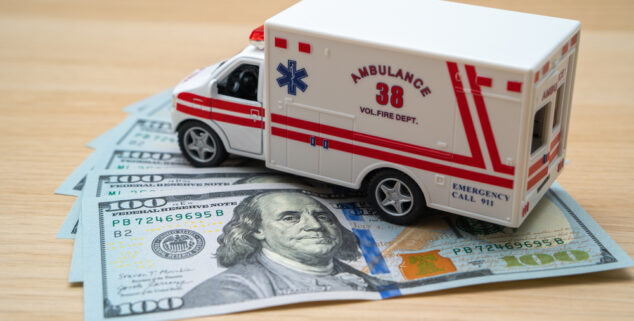News
Measure tackling ambulance surprise billing moving through the Legislature
 Image by IvanMel via Shutterstock
Image by IvanMel via ShutterstockWhen his teen son had a seizure, Irvine resident Chuck Bock called for an ambulance to rush him to the hospital.
While his son fortunately recovered, Bock was shocked a short while later to get a bill for $1,600 for the two-mile ambulance ride. He was fully insured by Blue Cross/Blue Shield and was stunned to realize that the health insurance company didn’t cover ambulance service.
Assembly Bill 716, which passed the assembly with unanimous support, is intended to end those sky-high charges. Under the bill, ambulance providers couldn’t bill uninsured patients more than the established payment by Medi-Cal or Medicare fee-for -service amount, which is ever is greater. Medi-Cal pays $111, but AB 55, which passed the Assembly health committee, would raise that to $350.
For people with state-regulated health insurance or health plans who are covered for ambulance service, out-of-network ambulance providers would not be able to send any bill higher than the in-network cost-sharing amount to the consumer. In such cases, the insurer or health plan would have to pay the local ambulance rate for the service.
“The last thing anyone should be thinking about during a medical emergency is whether they can afford the ambulance ride,” said Assemblymember Tasha Boerner (D-Encinitas) in a statement earlier this year. “AB 716 prevents consumers from being hit with those surprise bills for ground ambulance service, protect the uninsured, and help ensure that the costs are better covered for the heroic work of our firefighters and paramedics.”
“The last thing anyone should be thinking about during a medical emergency is whether they can afford the ambulance ride.”
But the California Association of Health Plans, a trade association representing public and private health care plans, is opposing the bill “since it will increase health plan premiums by $67.3 million,” said Mary Ellen Grant, vice president of communications for the organization.
“CAHP typically opposes one-off health care mandates because they make health care less affordable to our enrollees,” she said. “The total cost of all introduced health care mandates this session adds up to nearly $1 billion. We are urging lawmakers to always look at the bigger picture by cumulatively reviewing the costs of proposed mandates and to consider the impact that they will have on the affordability of health care for all Californians.”
Anthony Wright, executive director of Health Access California, a nonprofit that advocates for quality, equitable, affordable health care, said patients shouldn’t have to foot the bill for surprise higher charges when they have no control of which provider is picking them up. Often, the person who calls the ambulance is different than the patient and is not aware of who the in-network providers are.
“The ambulance bill may come the quickest and may be the most aggressive and send people to collections,” Wright said. “If the insurance is requiring a $50 co-pay for the ambulance, you shouldn’t be paying $1,500.”
A national analysis found that in 2018, 73 percent of emergency ground medical transports in the state included an out-of-network charge, according to the Assembly floor analysis.
Wright said his organization hasn’t faced any pushback when talking to legislators. “Everybody agrees that this is an unconscionable problem that people are getting ridiculous bills for needing an ambulance and calling 911.”
According to the Los Angeles Times, ambulance service used to be mostly free for patients because it was provided either by volunteers or fire departments using taxpayer money. While federal law requires health plans to cover out-of-network ambulances at “usual and customary rates,” there are no standards as to what that should be. “Health plans often set their usual and customary rates much lower than what an ambulance provider charges, leaving patients open to financial liability for the remainder of the charges,” the Assembly floor analysis said.
“Everybody agrees that this is an unconscionable problem that people are getting ridiculous bills for needing an ambulance and calling 911.”
Bock’s experience with his son happened in 2013 but it weighed heavily on his mind. While he was able to negotiate the bill down to $1,100 from the original $1,600, he realized he never wanted to face that situation again.
Later when his mother-in-law had health issues, she faced the same concerns because her Kaiser health insurance plan also didn’t cover ambulance services. “Every time she had a problem, one of us would drive her to the (emergency room),” Bock said.
Then in 2019, he had a heart attack and called on his son to take him to the hospital. “What was going through my mind was – am I really that sick? Do I want to go through with this?” Bock said. He passed out in the car and had to be carried in for services.
Financial concerns shouldn’t prevent people from getting the health care they need, Bock said. “You don’t want people to make determinations on health care” based on money, he said.
AB 716 received final approval in the Assembly on May 30th and is now awaiting a hearing in the Senate Health Committee.
Want to see more stories like this? Sign up for The Roundup, the free daily newsletter about California politics from the editors of Capitol Weekly. Stay up to date on the news you need to know.
Sign up below, then look for a confirmation email in your inbox.

Leave a Reply